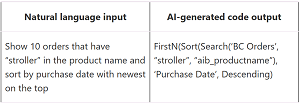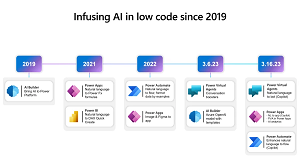News
AI Is Taking Over the 'Low-Code/No-Code' Dev Space, Including Microsoft Power Apps
So Microsoft isn't investing billions of dollars into ChatGPT and GPT-4 creator OpenAI for nothing.
Fresh on the heels of the advanced GPT-4 offering from OpenAI, Microsoft today announced its Power Platform "is reinventing software development with AI-powered no-code development."
The company announced "Copilot" was coming to the entire Power Platform, including the low-code/no-code Power Apps development component, a companion to Power Automate and Power Virtual Agents. That moniker borrows from the GitHub Copilot "AI pair programmer" that developers now use regularly in Visual Studio and Visual Studio Code. The magic behind the OpenAI Copilot-infused offerings comes from supercharged natural language processing (NLP) tech that lets machines interact with humans in such a way it's hard to tell the generated AI prose is coming from a machine.
On the flip side of that is NLP input that results in generated content, as Microsoft yesterday said, "Now, if you can imagine your solution, you can simply describe it in everyday language, and Copilot can create it for you via an intuitive and intelligent low code experience. Copilot will accelerate development for citizen and professional developers alike."
Here's an example of a NLP input and the resulting generated code:
 [Click on image for larger view.] NLP Input and Resulting Code (source: Microsoft).
[Click on image for larger view.] NLP Input and Resulting Code (source: Microsoft).
Another Microsoft March 16 post lists examples of natural language prompts that developers can use:
- "Create a time and expense application to enable my employees to submit their time and expense reports."
- "Build an application to automate the manual process of creating and approving customer invoices."
- "Generate an employee onboarding application to capture new hire information and share training content and learning modules."
Power Apps Copilot in Action (source: Microsoft).
AI taking over the low-code/no-code space isn't new and was summed up by Forbes in an article last year that detailed "The 10 Best Examples Of Low-Code And No-Code AI."
In fact, the company NoCode.ai debuted way back in April 2021 with a mission to "Build AI Solutions without Coding."
But all of that has been taken to a new level with advanced tech like GPT-4, the latest in a years-long series of moves by Microsoft, which is clearly gaining an edge in the AI space over competitors like Google, Apple and so on.
"Microsoft Power Platform has been on a journey to empower all developers with AI-powered development experiences since 2021," Microsoft said yesterday. "Power Apps was one of the first products to use GPT in a commercial capacity, and express design in Power Apps has enabled makers to automatically turn their drawings, images and Figma documents into app user interfaces (UIs). This union of AI and low-code revolutionizes the way solutions are built and fundamentally transforms the way people work, collaborate, and create."
 [Click on image for larger view.] Microsoft's AI Progression (source: Microsoft).
[Click on image for larger view.] Microsoft's AI Progression (source: Microsoft).
That announcement came shortly after Microsoft revealed it had for some time been using pre-release GPT-4 tech to power its "new Bing" search experience. A $10 billion-plus investment apparently buys a lot of leverage in getting first dibs on proprietary tech from a company that when it debuted way back in 2015 said, "Since our research is free from financial obligations, we can better focus on a positive human impact."
After yesterday's debut of GPT-4, some data scientists noted that OpenAI didn't disclose technical details backing the latest iteration of its advanced AI system like it has in the past, speculating the company is switching from a research focus to a revenue-generating focus, something clearly detailed in an article yesterday from The Verge.
Thus, "democratizing development and enabling even more people to create innovative solutions through natural language," as Microsoft yesterday said it's doing, naturally comes with a pricing plan, like just about every other software development offering (VS Code being a rare open-source-based exception).
It's unclear if Power Apps pricing will be increased following the infusion of Copilot, but it does come with a free 30-day trial.
About the Author
David Ramel is an editor and writer at Converge 360.